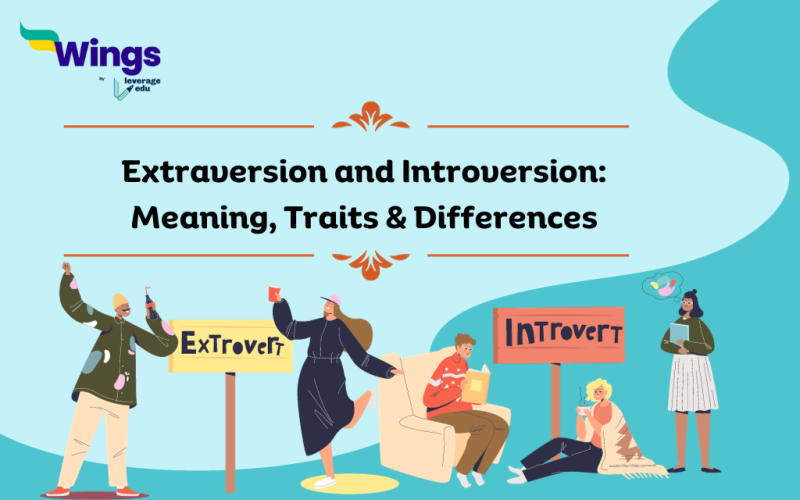Have you ever wondered why some people thrive in social settings and easily make new friends, while others prefer solitude and find small talk exhausting? The answer lies in the concept of extraversion and introversion – two personality traits that shape the way we interact with the world around us. The history of extraversion and introversion dates back to September 1909 when Swiss psychiatrist Carl Jung used the term. In this blog, we will learn more about the two terms and know their traits as well as the differences between the two.
Table of Contents
- 1 What is Extraversion or Who are Extroverts?
- 2 The Traits and Behaviors Associated with Extraversion or Extroverts
- 3 What is Introversion or Who are Introverts?
- 4 The Traits and Behaviors Associated with Introversion or Introverts:
- 5 Difference Between Extraversion and Introversion Personality Type
- 6 FAQ
What is Extraversion or Who are Extroverts?
Extraversion is a personality trait characterized by a preference for external stimulation such as social interaction and the external environment. Individuals who identify as extroverts tend towards outside social situations, enjoy being the centre of attention and often want to live in group settings. They are mostly outgoing, gregarious, and energized by social interactions and connections.
According to research, extroverts often possess a higher sensitivity to rewards, making them more likely to seek out stimulating experiences and engage in risk-taking behaviour. This trait is also associated with a higher level of dopamine activity in the brain, which contributes to feelings of pleasure and excitement when surrounded by others.
Also Read – World Introvert Day: Date, Theme, History, Significance, and Interesting Facts
The Traits and Behaviors Associated with Extraversion or Extroverts
- Sociability: Extraverts enjoy being around people and are often described as outgoing, talkative, and friendly.
- Energy Gain: Social interactions energize extroverts and leave them feeling recharged and invigorated.
- Risk-taking: Extraverts are more likely to engage in adventurous activities and seek out new experiences.
- Verbal Fluency: They often express themselves with ease, verbally processing their thoughts and ideas.
- External Focus: Extraverts have a tendency to focus on the external environment, taking in sensory information and stimuli.
What is Introversion or Who are Introverts?
On the other end of the spectrum lies introversion, a personality trait characterized by a preference for internal stimulation such as thoughts, feelings, and solitude. Introverts find social interactions draining and prefer quieter and more solitary activities. They often require alone time to recharge and process their thoughts and emotions.
Contrary to popular belief, introversion is not synonymous with shyness or social anxiety. While introverts may exhibit these traits, they are not inherent to introversion itself. Introverts can be highly sociable and enjoy the company of others, but they also need ample time for reflection and rejuvenation for themselves.
Also Read – Top 6 Careers for Ambiverts
The Traits and Behaviors Associated with Introversion or Introverts:
- Solitude: Introverts value alone time and prefer solitary activities such as reading, writing, or simply being in their own thoughts.
- Energy Drain: Social interaction can be draining for introverts and they need time to recharge after prolonged periods of external stimulation.
- Thoughtfulness: Introverts tend to internalize their thoughts and feelings and often engage in deep introspection.
- Selective Socializing: While introverts may not seek out social interactions as frequently, they still enjoy meaningful connections with close friends and family.
- Internal Focus: Introverts have a propensity to direct their attention inward and focus on their thoughts, emotions, and internal experiences.
Difference Between Extraversion and Introversion Personality Type
There are many differences between extraversion and introversion but the most important of them are –
| Extroverts | Introverts |
| Thrive in groups and teams | Favours Independence |
| Seeks greater stimulation | Seeks less stimulation |
| Values deep experiences | Values broad experiences |
| Think and speak their mind | Thinks before speaking |
| Recharge around people | Recharge in Solitude |
Relevant Blogs
FAQ
There are four types of Introverts. They are – Social Introverts, Thinking Introverts, Anxious Introverts and Restrained/Inhibited Introverts.
When a person derives their energy from a being around group of people with traits like outgoing, high energy and thinking out loud, they are characterized as extroverts, while, people who derive their energy from being alone and with traits like looking inwards and deep thinking are characterized as introverts.
According to Carl Jung, the Swiss psychiatrist- Introversion is an “attitude-type characterised by orientation in life through subjective psychic contents”, and extraversion is “an attitude-type characterised by concentration of interest on the external object”.
That was some information about extraversion and introversion. For more such articles, make sure to check the trending events page of Leverage Edu.
 One app for all your study abroad needs
One app for all your study abroad needs













